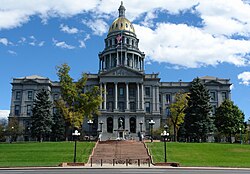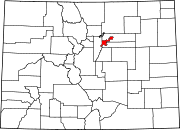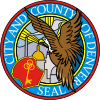List of neighborhoods in Denver

The City and County of Denver, capital of the U.S. state of Colorado, has 78 official neighborhoods used for planning and administration.[1] The system of neighborhood boundaries and names dates to 1970 when city planners divided the city into 73 groups of one to four census tracts, called "statistical neighborhoods," most of which are unchanged since then.[2]
Unlike some other cities, such as Chicago, Denver does not have official larger area designations. Colloquially, names such as Northside and Westside are still in use, but not well-known.[3][4] Since 2016, Community planners have used a set of 19 planning areas, all of which are groups of statistical neighborhoods, as part of the Area Planning process.[5][6]
Central
[edit]
- Baker
- Capitol Hill
- Central Business District
- Cheesman Park
- Cherry Creek
- City Park
- City Park West
- Civic Center
- Congress Park
- Country Club
- Lincoln Park
- North Capitol Hill
- Speer
- Union Station
East
[edit]
- Belcaro
- Cory-Merrill
- East Colfax
- Hale
- Hilltop
- Indian Creek
- Lowry
- Montclair
- Park Hill
- Virginia Village
- Washington Virginia Vale
- Windsor
North
[edit]
Northeast
[edit]
Northwest
[edit]
South
[edit]
- College View/South Platte
- Overland
- Platt Park
- Rosedale
- University
- University Hills
- University Park
- Washington Park
- Washington Park West
- Wellshire
Southeast
[edit]Southwest
[edit]West
[edit]- Athmar Park
- Barnum
- Barnum West
- Mar Lee
- Ruby Hill
- Sun Valley
- Valverde
- Villa Park
- West Colfax
- Westwood
Non-official neighborhoods
[edit]
- Alamo Placita – the part of the Speer neighborhood north of Speer Blvd., and encompassing the Alamo Placita Historic district and parts of two other Denver historic districts
- Ballpark District – an area that includes Coors Field and several blocks east, part of the Five Points neighborhood, and overlaps with RiNo
- Burns Brentwood – a subdivision in southwest Denver, eastern portion of Harvey Park neighborhood
- Crestmoor – an area near Crestmoor Park in the Hilltop neighborhood
- Curtis Park – a portion of the Five Points neighborhood
- Golden Triangle – an area incorporating many of Denver's civic and cultural institutions, closely corresponds with the Civic Center neighborhood
- Hampden Heights
- LoDo – "Lower Downtown," the original settlement of Denver, with many of its oldest buildings, overlapping parts of the Union Station and Five Points neighborhoods
- LoHi – "Lower Highland," the eastern portion of the Highland neighborhood
- Mayfair
- Parkfield
- RiNo – "River North," part of the Five Points neighborhood
- Northside – a large area of northwest Denver
- South Denver – an area encompassing several neighborhoods south of Alameda Blvd., and the name of municipality annexed into Denver in 1894
- Uptown – an area roughly corresponding with North Capitol Hill neighborhood
Registered Neighborhood Organizations
[edit]In 1979 a Denver ordinance created the Registered Neighborhood Organization system intended to improve resident access to city government.[7] Registered Neighborhood Organizations (RNOs) define their own boundaries and must be open to all residents and property owners within those boundaries. Denver requires RNOs to re-register annually, so the complete list is subject to change; as of 2024, 180 RNOs are included in the city's catalog.[8] RNOs often correspond closely to official neighborhood names and boundaries, however names or boundaries may also derive from non-official neighborhoods, community or business interests, or colloquial usage. A few RNOs encompass large areas, and many RNOs overlap.
See also
[edit]- Bibliography of Colorado
- Geography of Colorado
- History of Colorado
- Index of Colorado-related articles
- List of Colorado-related lists
- Outline of Colorado
References
[edit]- ^ City and County of Denver, Community Planning and Development. "Denver Open Data Catalog: Statistical Neighborhoods". DenverGov.org.
- ^ Beaty, Kevin. "How Denver's neighborhoods got their shapes". Denverite. Denverit. Retrieved 31 July 2024.
- ^ Hunt, Rebbecca. "Northside History: A Tale of Two Neighborhoods". The Denver NorthStar. Colorado Community Media. Retrieved 31 July 2024.
- ^ Mead & Hunt. "Nuestras Historias: Mexican American/Chicano/Latino Histories in Denver An Historic Context" (PDF). City and County of Denver. City and County of Denver. pp. 64, 70. Retrieved 31 July 2024.
- ^ "Neighborhood Planning". City and County of Denver. City and County of Denver. Retrieved 31 July 2024.
- ^ "Neighborhood Planning Initiative Strategic Plan" (PDF). City and County of Denver. City and County of Denver. p. 10. Retrieved 31 July 2024.
Denver's 78 neighborhood statistical areas have been grouped together into 19 NPI planning areas. The purpose of grouping neighborhoods together is to increase the geographic coverage of each NPI plan and reduce the total number of plans required to achieve 100 percent coverage of the city. These groupings were first defined in 2016…
- ^ "Chapter 12, Article III. - Registered Neighborhood Organizations". Denver, Colorado - Code of Ordinances. City and County of Denver. Retrieved 31 July 2024.
- ^ "Registered Neighborhood Organizations". Denver, The Mile High City. City and County of Denver. Retrieved 31 July 2024.
External links
[edit]- The City and County of Denver
- List of Denver neighborhoods with descriptions, maps, homes – useful information for newcomers



